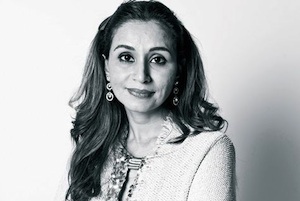By: Hyacinth Mascarenhas
Earlier this month, Custodian of the Holy Mosques King Abdullah issued a decree banning all men from working in lingerie shops in attempts to finally end an uncomfortable situation for modest women and reduce female unemployment in the kingdom.
Up until then, women who needed to buy bras or underwear had to discuss intimate details with male staff only to endure their embarrassing scrutiny, and buy it without even trying it on. Since undressing in a public place is far too close to men, fitting rooms are banned in the country.
Investment adviser and womens’ rights advocate, Reem Mohammad Asaad who started the campaign in 2008, spoke to elan about the struggle, strategy and behind the campaign.
How important was social media and the Internet in this campaign?
It was “everything”. It simply created the support base, without which lobbying for the issue would have been extremely difficult. Also, it made it easier to document the event live, collect press releases and lay it out to the world, all in one.
What was the turning point that led to this campaign victory?
None. It took more than three years of gradual mobility. I also credit the local media for regularly checking with me on the issue. Right before the decree was released, I was drafting a script for an infomercial self-broadcast message. I figured that published content may not be enough.
How did you and the people of Saudi Arabia react to King Abdullah’s decree to ban men from selling lingerie?
It was delightful. It came as part of a full “road map” of long-awaited labor reforms. So, in a way it was expected and much anticipated.
What was your strategy throughout? You didn’t really engage media, was that purposefully done?
Perseverance; like I mentioned, members of the media checked with me regularly for updates. I never shut them down. This was the fastest way to get the world out to the officials and policy makers. Social media reached to the younger masses, while the paper is for the “big people.” I played both cards.
I also consulted media specialists on how my approach, language used and any “faux pas.” I couldn’t afford “public mistakes.”
How did you handle government officials? It seems as if you included them within the discussion rather than working against them?
Along the way, I received calls from people I knew and other I heard of. They praised the work and supported the cause, which gave me a hint that the policy makers wanted me to “continue.” It was interesting how the messages came through indirectly.
How does this decision impact gender relations within the Kingdom?
Elevating the participation rate in the economy through work instigates social reforms that are probably irreversible. Historically, it has been proven that a working mother instills better work values in children and increases family income. In our days, where inflation is accelerating and incomes are relatively constant, need women’s participation, both in terms of productivity and consumption. In terms of “gender relations” this will be no easy ride, but observers note that men are now more accepting and approving of women’s employment, deal more easily with a female clerk (for instance) and gradually encourage their family females to search for jobs. The economic condition – in my opinion – is key behind that change.
How do you think this will impact other feminist initiatives within the country?
The Domino-effect. Frankly, I do not want to see hasty feminist movements attempting to completely tear down the current structure. Remember, there are many good things and solid values that characterize and Saudi society. Ideally, we need to first create a moderate shock, sit to reap the fruits, assess the impact and then move on from there. Learn from other nations is also important. Social change happens eventually and things are not as stagnant as they are viewed by the outside world. We just happen to be a closed society, and we don’t showcase our stories.
Is there anything else you would like our readers to know about the campaign or social issues in general?
I also want fellow women in America and elsewhere to reach out to us. With the help of social media and self-broadcast means things have never been easier. No stereotypes, no judgment, no phobia. Just reach out to one another and learn from each other, and of course, no blind faith in politicized media. They have an agenda and it’s often not in our best interest.
*Photo provided by BBC News






























[…] also added that this campaign would have a “domino effect” on other feminist initiatives within the region as well. “Ideally, we need to first create a […]
[…] Tactful Reem Asaad, a champion of women’s rights, talks strategy in Saudi. June 14, 2011. […]